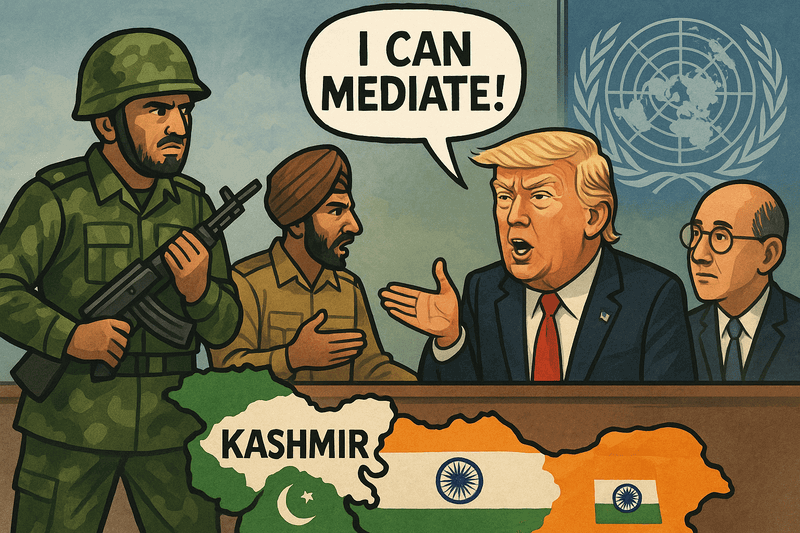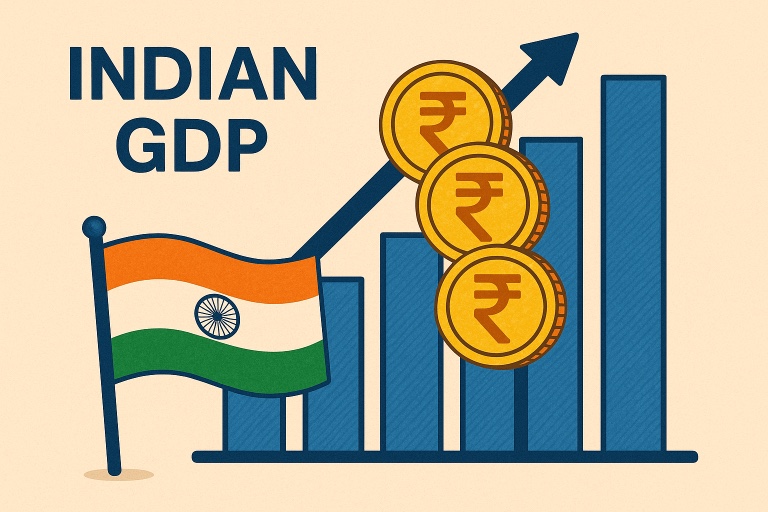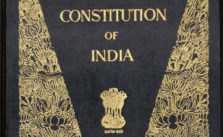Recently, U.S. President Donald Trump claimed that the “Kashmir issue has been going on for a thousand years or more.” Let’s be honest — that’s not just wrong, it’s embarrassingly uninformed.
The Kashmir issue is not what the world has been led to believe. It is not an age-old religious conflict or a simple territorial dispute between India and Pakistan. It is the product of a flawed, violent, and deeply divisive ideology that tore apart a united civilization barely 80 years ago — and continues to poison the future of South Asia.
When world leaders and institutions echo such factually incorrect narratives, they don’t just spread confusion — they legitimize propaganda. These ideas are repeated in international forums, university debates, and increasingly by misguided Muslim youth, many of whom have been fed a simplified and distorted version of history.
This article is written to set the record straight — not with emotion, but with historical facts and clarity. It is a call to global leaders, institutions, and everyday citizens to stop entertaining the false narratives propagated by Pakistan and to start understanding the truth behind the Kashmir issue — not from centuries ago, but simply by looking 80 years back.
A Manufactured Conflict, Not a Natural One
Before 1947, there was no Pakistan. There was no Kashmir conflict. The Indian subcontinent was one land — diverse, multicultural, and complex — but united in its identity. It was only when a group of leaders pushed the idea that Muslims couldn’t live alongside people of other religions that the demand for Pakistan emerged. The result? A partition soaked in blood, mass displacement, and an artificial fracture of a civilizational whole.
Kashmir was, and remains, part of that Indian whole. At the time of partition, its ruler legally acceded to India. Pakistan’s reaction was not diplomacy — it was invasion. What followed was decades of aggression, propaganda, and the cynical use of religion to justify territorial obsession.
Let’s be clear: Kashmir is not disputed — it is occupied. Not by India, but by Pakistan through its illegal control of parts of the region and its export of terrorism across the border.
Pakistan: A Nation That Couldn’t Hold Itself Together
Pakistan claims to be the protector of Muslims everywhere, yet it failed to protect its own. If shared religion were truly enough to build national unity, Pakistan would not have collapsed within 24 years of its creation. In 1971, after years of brutal suppression by West Pakistan’s Punjabi-dominated elite, the Bengali Muslims of East Pakistan rose up. They were not treated as brothers — they were massacred, silenced, and eventually liberated through the creation of Bangladesh.
This collapse was not an isolated failure. Today, Balochistan, Pakistan’s largest and resource-rich province, faces a sustained freedom movement led by the Balochistan Liberation Army (BLA). The BLA has accused the Pakistani military and political elite — again, largely dominated by Punjab — of decades of exploitation, enforced disappearances, military crackdowns, and economic marginalization. These are not just internal skirmishes; they are deep wounds revealing the ongoing disintegration of national unity.
In fact, Balochistan declared independence in August 1947, shortly after Pakistan’s formation — a fact often erased from mainstream narratives. It was only forcefully annexed by Pakistan in 1948. Since then, multiple uprisings have erupted, brutally suppressed by the state. The current insurgency, driven by demands for autonomy or complete independence, is proof that Pakistan’s foundational strategy — of using religion as glue — has failed yet again.
This alone should destroy the myth that Islam unites Pakistan’s agenda. In reality, Pakistan has never been about unity — it has always been about control, domination, and military hegemony, masquerading as religious concern.
Kashmir Will Always Be India
Kashmir is India — not because of demographics or religious identity, but because of history, law, and culture. It is a thread in the fabric of Indian civilization. Its inclusion in the Indian Union is final, legal, and irrevocable.
And let this be said plainly: As long as India exists, Kashmir will remain India. The very idea of another partition based on religion is dead, and any attempt to revive it is not only futile — it’s offensive to the memory of the millions who suffered during the first partition.
If Pakistan continues to obsess over Kashmir, pushing false narratives and fueling unrest, then perhaps it is time for India to reconsider the broader historical injustice of partition itself. Perhaps it is time to reflect on a future where the subcontinent — broken by colonial scheming and religious extremism — could once again find unity.
The Forgotten Tragedy: Kashmiri Pandits and the Islamization of the Valley
One of the most tragic and deliberately ignored chapters in the Kashmir story is the ethnic cleansing of Kashmiri Pandits. In the late 1980s and early 1990s, as Pakistan-backed Islamist insurgency gained ground in the valley, thousands of Pandits — members of an ancient Hindu community indigenous to Kashmir — were targeted through assassinations, threats, and brutal intimidation. They were given ultimatums: leave, convert, or die. The Indian state was caught off-guard, and over 300,000 Kashmiri Pandits were forced to flee their ancestral homes — turning them into refugees in their own country.
What followed was not just displacement but erasure. Entire communities vanished. Temples were desecrated, properties seized or destroyed, and cultural heritage systematically wiped out. And while the world remained largely silent, the valley transitioned demographically into a Muslim-majority region — not organically, but through orchestrated terror and fear.
This demographic shift is not a footnote; it’s a central fact. It shows that the so-called Kashmir cause is not about freedom or justice — it is about religious exclusivism and ideological control. And it’s time the world calls it exactly what it is.
To Pakistan: Stop the Daydream
It’s time Pakistan stops living in a dangerous daydream. Decades of fantasizing about annexing Kashmir have brought the country nothing but economic ruin, diplomatic isolation, and social instability. Instead of chasing shadows, Pakistan must focus on its own people — their jobs, education, and future.
A nation that can’t feed its citizens, educate its children, or maintain basic order has no business trying to claim territory beyond its borders — especially not through proxy wars and terrorism.
To the World: Stop Entertaining False Narratives
The U.S. President Donald Trump recently remarked that the “Kashmir issue has been going on for thousands of years.” That’s not just wrong — it’s dangerously ignorant. The India-Pakistan conflict began in 1947, not 1,000 years ago. Is it too much to ask world leaders to look back just 80 years into history before offering commentary?
When global leaders echo such misinformation, they do more than insult a region’s intelligence — they legitimize false propaganda. They embolden those who exploit religious identity to justify violence and division.
It’s time the world — especially democratic nations — stopped indulging Pakistan’s propaganda. The same country that harbored Osama bin Laden, supports terror networks, and censors its minorities should not be treated as a credible voice on “human rights” in Kashmir or anywhere else.
A New Vision: Unity Without Borders
The Kashmir issue is not just about land. It is a mirror reflecting the consequences of division — and the possibility of unity. India, despite its own flaws and challenges, remains committed to democracy, pluralism, and coexistence. That is the only viable future for Kashmir, and indeed for the region as a whole.
The path forward is not to redraw borders, but to rise above them. Not to divide people, but to unite them — not in the name of religion, but in the name of peace, justice, and truth.
And that begins with rejecting falsehood — firmly, fearlessly, and forever.



